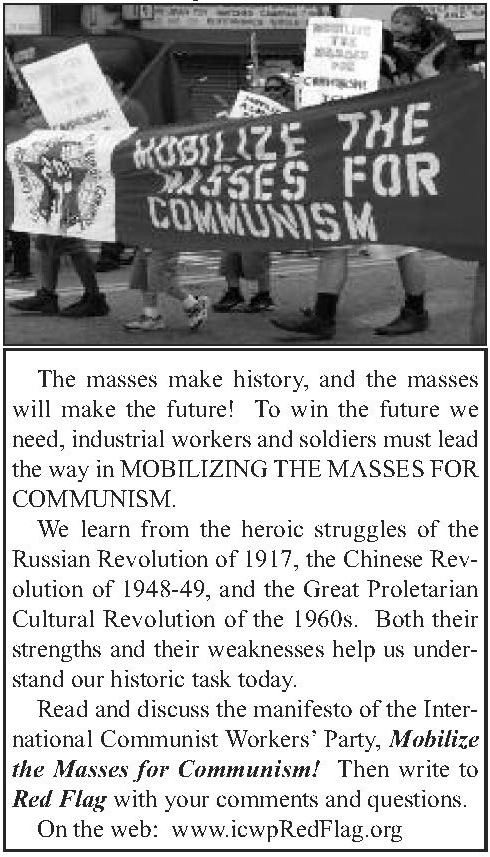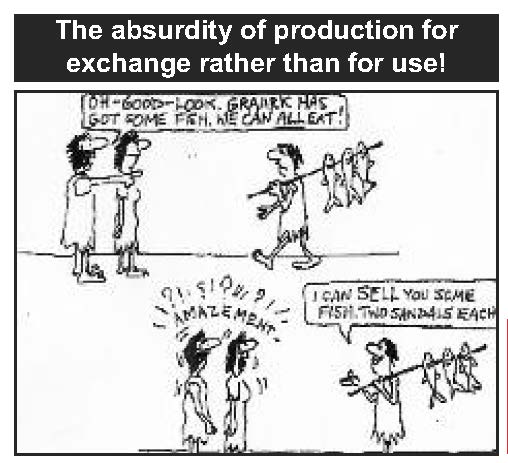|
To join study groups that will be discussing this topic, contact us
at (310) 487-7674 or
e-mail: ICWP@anonymousspeech.com
Workers Can Run
Society!
MYTH: workers aren't capable of
running things…chaos would erupt if
we didn't have bosses.
How often do we hear this? In Feudal times it
was said that without a King, Queen, Nobles,
and Clergy—-everything would fall into immoral
violent unruliness because the
peasants/serfs wouldn't know how to run society.
Fear was spread to maintain the status
quo then and fear is spread today to protect
the current hierarchy. Eventually the monarchy
was overthrown and now it's time for us to
overthrow our oppressors.
An increasing body of literature talks about
"Workers Self-Directed Enterprises," or "Coops."
Promoters of co-ops often call them alternatives
to Capitalist modes of production.
However, co-ops function within Capitalism
and are not free from the need to produce for
profits for survival in the Capitalist market.
Still, we can describe them for folks who mistakenly
believe that workers wouldn't know
how to run things without the bosses or the rich,
who do very little or nothing while we do ALL
Workers within co-op enterprises make all decisions
related to production: what is produced,
how it's produced, how much is produced, etc.
It's said that co-ops create an "environment
of equals" where workers enjoy their work,
work well together, and are more creative.
This helps demonstrate how workers ARE CAPABLE
of running things even without overrated
Harvard/Cambridge MBAs.
Some co-ops are small, like groups of 10 to 20
Silicon Valley engineers who leave large companies,
such as Oracle and IBM to form a coop.
The largest co-op frequently cited, The
Mondragon Corporation, a federation of worker
cooperatives based in the Basque region, is the
7th largest corporation in Spain, with about
120,000 workers.
However, these examples only show that workers
can run capitalist enterprises.
At some
point surplus value is extracted, and production
for exchange value rather than use value
continues. It's important to understand the
huge difference between co-ops and the communist
society we need.
Future articles will describe how the communist-inspired masses in China began to organize
and run production along very different lines,
and the limitations of these great experiments.
|
|
Red Flag has described work under communism
and what motivates workers to do
it. Under communism, our class collectively
runs society. Production is for use,
not profit. There are no bosses, money,
privileges, personal wealth, or private
property. Everyone works for the common
good and shares in the results. Communism
frees the masses to make the decisions
that affect us all.
Are you motivated to fight for communism
yet?
 Communism combines learning and work.
Classrooms are centers where we put
knowledge to work based on theory and
practice. Schools aren't separate from factories,
laboratories, or hospitals…they are
the same place! Under communism, we
are workers and students!
Communism combines learning and work.
Classrooms are centers where we put
knowledge to work based on theory and
practice. Schools aren't separate from factories,
laboratories, or hospitals…they are
the same place! Under communism, we
are workers and students!
Also, we're motivated by safer and more
fulfilling work because we can see how our
labor directly helps society. Communism
encourages workers' creativity and innovation.
We meet frequently to discuss communist
ideas and how to advance and
deepen our communist social relationships
while figuring out how to apply them to
better feed, shelter, dress, cure, educate,
politically develop and improve the lives of
the world's workers.
Mobilizing the Masses for Communism uses the example of the Chinese Cultural
Revolution to demonstrate that workers
know best how to meet our class's needs.
Masses of peasants mobilized to build irrigation
systems and organize cafeterias,
where everyone could eat, and so that they
no longer paid for food. In fact, the
masses implemented many aspects of
communist relations in large localities all
over China.
Workers are also motivated by the opportunity
to live in a communist society, where
social relationships of cooperation, collectivity
and share-and-share alike are primary.
Communism abolishes all borders,
allowing us to live, work, and share together
for our class as a whole.
Work is also different because there is no
separation between mental and manual
labor. No one is more valued than another
because of how, or how much, they contribute
to society. All are struggled with to
contribute to society according to their
abilities and commitment.
Communism will wipe out much of the
anti-social behavior that capitalism's wageslavery
job culture breeds. We implement
all these ideas in ICWP today.
So, now that you're even more motivated
to fight for communism, join us or increase
your commitment to your party!
Read, write for, distribute, and contribute
funds to Red Flag!
WE CAN'T EAT MONEY! 
Communism nurtures critical and creative
thinking to improve collaborative efforts, freeing
us to think of innovations. Psychological
theories of instinct, drive-reduction, and motivation
help to explain this.
Instincts are innate, untrained, fixed responses
that are common among most members of a
species. Humans are instinctively curious and
creative. Optimal Arousal Theory states we actually
require novelty and complexity from our
environment.
Pre-class societies provided for their needs collectively.
The community's needs were primary
over the individuals' because that way the individuals'
needs were also met. When everyone
helps grow food and build shelter, the labor
and time involved is lessened. Time and energy
are freed to focus our instinctive curiosity
and creativity on contributing to the art,
health, transportation, and social cohesion of
the collective.
Drive-Reduction Theory notes our bodies' need
to maintain an internal balance (homeostasis).
For example, we need to eat because our bodies'
nutrient stores are depleted. This leads to
the drive to eat, and then this drive is reduced.
In communist society we collectively produce
and collect food to meet this need. Did you see
money come into this drive-reduction scheme?
Because communism nurtures our instinctive
curiosity and creative thought, we design new
ways of doing things. We can spend less time
and labor and get an improved source of food.
Meanwhile we'll have a symbiotic relationship
with nature, not a destructive impact.
Motivations to work can be intrinsic (internal,
mental, physiological) or extrinsic (external).
The internal drive to eat is fulfilled without any
external reward like money. The internal reward
for being able to meet this need is the
primary motivating factor and leads directly to
innovation. Extending this, when money is
made primary, as in capitalism, we are actually
less motivated to improve the process of getting
food and will work individually rather than
collectively.
Let's discuss these ideas more and fight for
communist revolution so that future communist
generations can continue to improve society
Next Article
|


 Communism combines learning and work.
Classrooms are centers where we put
knowledge to work based on theory and
practice. Schools aren't separate from factories,
laboratories, or hospitals…they are
the same place! Under communism, we
are workers and students!
Communism combines learning and work.
Classrooms are centers where we put
knowledge to work based on theory and
practice. Schools aren't separate from factories,
laboratories, or hospitals…they are
the same place! Under communism, we
are workers and students!